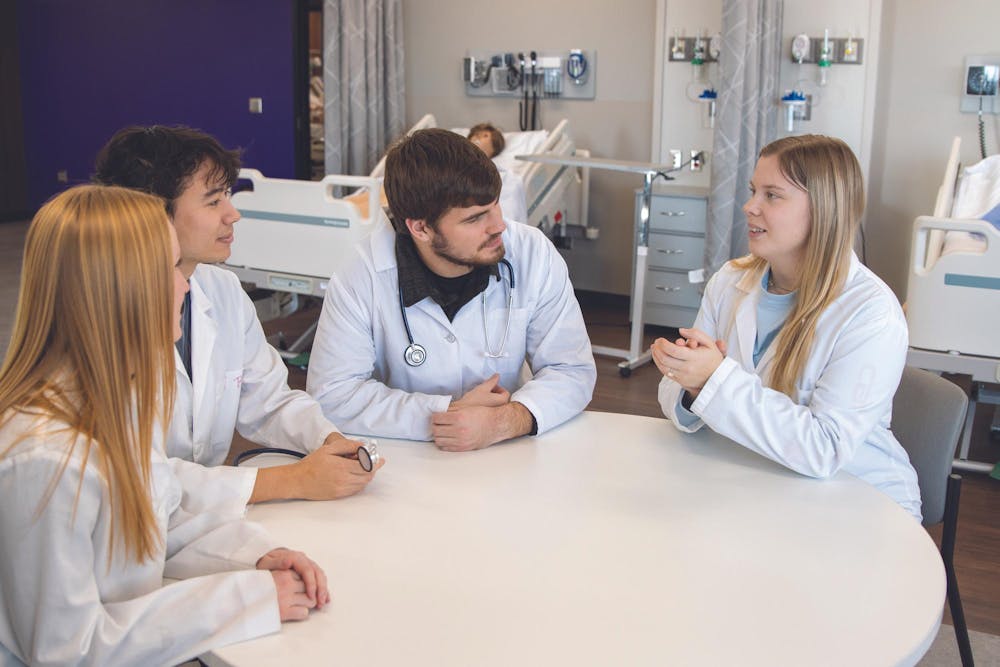Taylor’s Master of Science in Physician Assistant Studies program was granted accreditation-provisional status in June. The program began operations with its first cohort of 40 students this August.
Accreditation-provisional status is the normal, entry-level position for developing physician assistant (PA) programs, Lori Fauquher, program director and associate professor of physician assistant studies, explained.
Granted by ARC-PA, the national accrediting body for physician assistant programs, the program’s accreditation-provisional status will last four to five years, Fauquher said. Throughout this period, ARC-PA will visit Taylor twice to monitor the program’s progress.
After those two visits, the accrediting body will assess the program and decide if it will upgrade the program’s status to accreditation-continued. This milestone would allow the program to operate for 10 years without another check-in from ARC-PA.
The program received an unexpected denial of accreditation-provisional status in March 2025. However, the program’s administrators appealed the decision in April on the grounds that the issue was clerical in nature and not based upon the integrity of the program, Fauquher said.
Emily Broadstock, a student in Taylor’s PA program, praised the administration for their communication and support to accepted students during the period of waiting. The students received an email on June 18 that ARC-PA had granted the university’s appeal and the administration was continuing to push for an August start date.
Broadstock described the following month-and-a-half as a “mad dash” while she searched for housing and ironed out the details of moving her life to Upland.
“The whole team in the PA department just really went above and beyond for us,” Broadstock said. “It's just been the common theme — they go above and beyond for us every single day. It's so, so encouraging.”
Broadstock added that PAs hold a very unique position within the framework of medical care. Offering more versatility, PAs can work in a variety of settings, from surgery to occupational therapy to the emergency room.
A position developed to increase the reach of medical care, PAs collaborate with trained physicians to diagnose and treat patients, Fauquher explained.
“(PAs) just allow the physician to extend further, essentially,” Fauquher said. “So we always think of ourselves as kind of extra hands and extra eyes for the physician. We work in a collaborative relationship.”
Taylor’s PA program is 27 months in total. Students spend the first 15 months doing classroom learning, Jonathan Byers, associate professor of physician assistant studies, said.
During this period, students will take a variety of courses, from pharmacology to clinical medicine.
“When they're done with this first 15 months here, our goal is that they know how to relate to patients, to ask the right questions of patients, to develop a diagnosis,” he said.
After completing classroom and lab learning, students will be able to perform a full physical exam, order appropriate tests, and perform routine medical skills such as incisions and sutures, Byers added.
In the following 12 months, students will complete nine, one-month clinical rotations in different medical settings, Fauquher said.
Overall, the program consists of 41 courses, including the clinical rotations, which comes to a total of 112 credit hours.
“So we do think about it as basically a quick fly-through medical school,” Fauquher said. “Because you're learning essentially all the same things and a lot of content still, in a much shorter period of time. So a very condensed curriculum.”
With over 300 PA schools in the nation, Taylor’s emphasis on Christ-centered care, servant leadership and lifestyle medicine sets this program apart, Fauquher said. The program is using the American College of Lifestyle Medicine’s curriculum, which underscores the importance of holistic healthcare and preventative medicine.
If students are considering applying to Taylor’s PA program, Fauquher recommended looking at the prerequisites on Taylor’s website to make sure they are staying on track while earning their bachelor’s degree.
Broadstock also encouraged students to seek experience in the medical field, whether as a patient care tech, medical assistant or CNA.
“Any role that you can have with direct patient care is going to let you know really quickly if (the medical field) is where you think you should be,” Broadstock said.
Byers also urged students to shadow a PA. By observing the role in action, he believes students can discern whether or not the position would be a good fit.
Taylor’s application cycle for the PA program opens in April and closes Nov. 1., with interviews for finalists being conducted January 2026. Of the applicants, only 40 students will be accepted to the program. Students can apply to the program through the Centralized Application Service for Physician Assistants (CASPA), Fauquher said.
With its rigorous curriculum, supportive staff and Christian focus, Broadstock looks forward to seeing the fruit of Taylor’s unique PA program.
“We're completely integrating Christ into what we do every single day,” Broadstock said, “And I think that's so incredible because this specific program offers PAs that are going to come out of it ready to treat an entire patient—holistically, spiritually, medically—because we've had Christianity ingrained into into our learning process.”





